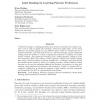Free Online Productivity Tools
i2Speak
i2Symbol
i2OCR
iTex2Img
iWeb2Print
iWeb2Shot
i2Type
iPdf2Split
iPdf2Merge
i2Bopomofo
i2Arabic
i2Style
i2Image
i2PDF
iLatex2Rtf
Sci2ools
121
click to vote
AI
2008
Springer
2008
Springer
Label ranking by learning pairwise preferences
Preference learning is a challenging problem that involves the prediction of complex structures, such as weak or partial order relations, rather than single values. In the recent literature, the problem appears in many different guises, which we will first put into a coherent framework. This work then focuses on a particular learning scenario called label ranking, where the problem is to learn a mapping from instances to rankings over a finite number of labels. Our approach for learning such a ranking function, ranking by pairwise comparison (RPC), first induces a binary preference relation from suitable training data using a natural extension of pairwise classification. A ranking is then derived from the learned relation relation by means of a ranking procedure, whereby different ranking functions can be used for minimizing different loss functions. In particular, we show that weighted voting minimizes the Spearman rank correlation. Finally, we compare RPC to constraint classificatio...
Related Content
| Added | 08 Dec 2010 |
| Updated | 08 Dec 2010 |
| Type | Journal |
| Year | 2008 |
| Where | AI |
| Authors | Eyke Hüllermeier, Johannes Fürnkranz, Weiwei Cheng, Klaus Brinker |
Comments (0)

